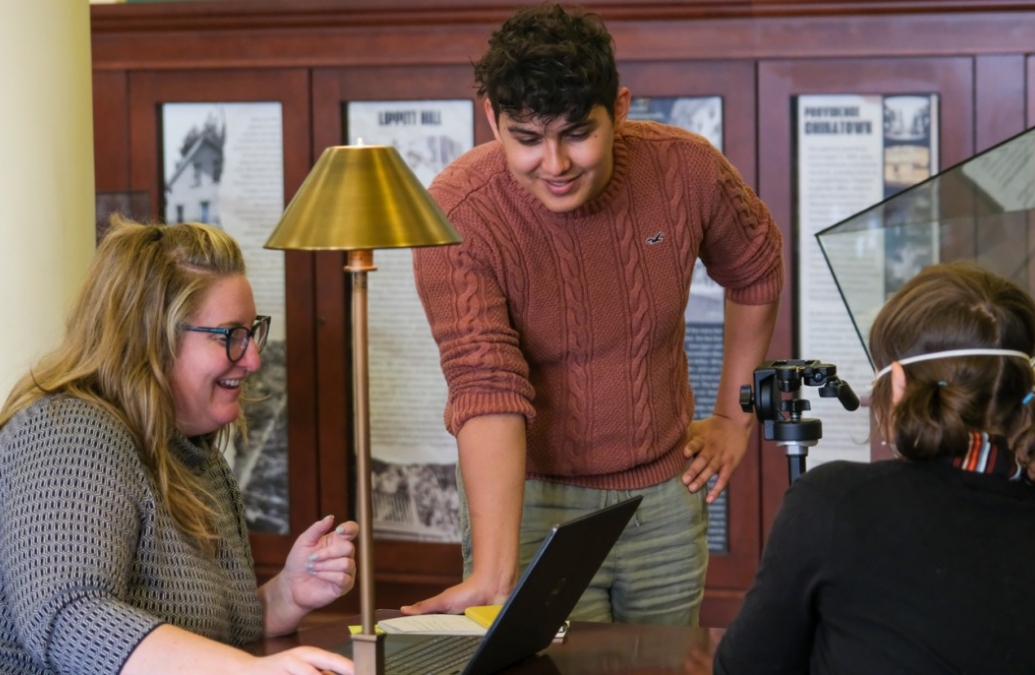Brown student teams up with Providence Public Library to present food and culture exhibition

Rhode Island is renowned for its seafood, yet the annals of history have devoted scarcely three sentences to the story of what may be the state’s first oyster house.
Emmanuel Burnoon, once an enslaved cook in Providence, was freed in 1736 and opened his oyster restaurant soon afterward. Burnoon’s business was so successful that when he died in 1769, he left behind a house, a large lot of land and more than 500 pounds, or about $20,000 in today’s currency.
“It was upsetting to me that in a state that’s so famous for its seafood, I’d never heard of Emmanuel Burnoon,” said Aaron Castillo, a senior at Brown University. “I thought about how food can provide a way of remembering the diverse people who shaped life in Providence in the past, even if they have since been displaced, and even if history books have skipped over their legacies.”
Castillo wondered: What other stories has Providence forgotten? He took a deep dive into historical records — and then an exhibition was born.
As part of his senior thesis, Castillo has partnered with the Providence Public Library to present the resulting exhibition, titled “Who Has a Seat at the Table?” Curated by Castillo and featuring two local artists of color, the exhibition delves into the food cultures of Providence communities that were displaced by redevelopment and gentrification. It opens on Monday, May 1, at the library.
Drawing on more than a year of deep research conducted in partnership with PPL and academic libraries across the Ocean State, Castillo’s exhibition explores past neighborhoods such as Lippitt Hill — an African American neighborhood on the east side of Providence that was razed in the 1960s to make way for the University Heights apartment and shopping complex — and Chinatown — located on the west side of downtown Providence around the turn of the 20th century, until much of its infrastructure was demolished to make room for a wider Empire Street.
“When these neighborhoods were razed, it wasn’t just a matter of buildings being torn down; it was a matter of people’s lives being upended,” Castillo said. “That building was a home where families gathered to eat and celebrate, and where kids grew up. I just think those communities’ stories deserve to be told just as much as Roger Williams’ story, and food is a great way to remember communities we can’t physically visit anymore.”
Connecting food, culture and place
Castillo said that even though his formal research process, funded by a Royce Fellowship, began in June 2022, he has always been interested in the connections between food, community and history. Growing up at the very southern tip of Texas, Castillo remembers celebrating holidays and birthdays with dishes that reflected his Mexican heritage. When he moved to Providence to attend Brown, he saw that many of the city’s Central American, Azorean and Cape Verdean families placed a similar emphasis on keeping their cultures alive through food.
Castillo chose to design an independent concentration in food and identity — giving him room to sample Brown courses across the humanities and sciences to investigate how food can communicate someone’s heritage, feelings of affection and more. He’ll dive even deeper into the subject after graduation, when he travels to France to earn a master’s degree in food psychology. Then it’s back to Brown for medical school, after which Castillo plans to settle in Providence as a psychiatrist focused on helping people find more balanced mindsets around eating.
Because Castillo is enrolled in Brown’s eight-year Program in Liberal Medical Education, he knew he’d be in Providence for a long time. That’s why, as a first-year student, he joined the Bonner Community Fellowship program at Brown’s Swearer Center, which embedded him deeply in the local community.
“I wanted to make sure that I didn’t feel removed from the rest of Providence,” Castillo said. “It was important to me to feel like part of this community that is so much like the one I grew up in.”
